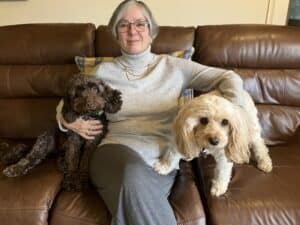Smartly dressed in her British school uniform, the small girl bounds contentedly through the door of her roomy new home in the Somerset countryside. Two cheerful little dogs named Muffin and Biscuit are the first to greet her. Later, there will be ballet class and time to play in the house’s idyllic English garden.
But one year ago, things were very different. Only six years old, Ksusha, her mother Nadiia, and older sister Yaroslava were displaced and living as refugees in Poland after fleeing their home in Sumy, Ukraine, to escape the escalating war. Now safe as a result of the UK government’s Homes for Ukraine visa sponsorship program, their lives have begun to stabilize with new friendships, language lessons, and cultural support as they integrate into British daily life.

Gilly Smith, the woman who compassionately opened her home for Nadiia and her daughters, says she is grateful to have the space available to be able to host the family, who in turn have added a new dimension to her life. “It’s lovely when the girls come home,” says Smith, who works for SAP as a partner delivery manager for solutions from SAP SuccessFactors. “They see immediately if I’ve got my headset on as to whether or not they can be noisy or come in and give me a big hug and tell me about their day.”
“I had a really quiet life before,” says Smith, thinking back to when it was just her, her husband, and the two dogs at home. “Now there’s a lot of activity.” She pauses to lean in, tilts her head, and shares a gem of insight gleaned from her experience: “In the same way that working within a team you need diversity and different ideas, it’s the same in a home life. It’s great having different ages in the same house. It’s energizing.”
“We Need to Do This”
In her SAP role, Smith works with SAP partners in many countries to deliver success to customers. In her global team, where she is the regional lead for Europe, colleagues work from locations as varied as Australia, Ireland, and Fair Isle in Shetland. She values the open, direct communication that she has with SAP partners, which she says makes her work very enriching. “This is the best job at SAP. It’s a fabulous job because I’m working with partners.”
Born in New Zealand, Smith says her intercultural experiences have mostly centered on Western Europe. So, it was a feeling of profound empathy that prompted her to help displaced families from Ukraine. “What motivated me was hearing on the news about this, particularly women and children fleeing, and I just thought if I had a daughter, I would want somebody to look after them, to at least house them and make sure they had food.”
Her husband felt the same. During the pandemic, the couple had made the decision to move to the countryside in preparation for eventual retirement. A tax incentive from the government sweetened the deal and they felt very fortunate to find a spacious, bright house in rural Somerset – which they now wanted to share with a displaced family. “There was really no discussion about it. We just looked at each other and said, ‘We need to do this. We’ve got the space.’”
Bureaucracy and Hugs
The initial step to enroll as a sponsor in Homes for Ukraine was as easy as ticking a box. But Smith and her husband almost abandoned the process many times due to cumbersome bureaucratic forms with no support. For example, Smith had to find someone from Ukraine to sponsor, which meant combing endless social media profiles for a faint connection. “You’re reading these absolutely tragic stories. It was really depressing,” recalls Smith. She finally found a young woman named Nadiia with two daughters, ages five and eleven, who wanted to be near Yeovil, a town near Smith. “I think I’ve found somebody,” Smith told her husband.
However, government forms that required documents in Ukrainian nearly jeopardized the match. “It was just the most terrible form I’ve ever tried to fill in. It was so stressful, I burst into tears.” On March 27, 2022, they submitted the required information.
And then they waited…and waited. There were no updates from the authorities for three months. She and her husband began to lose hope of bringing Nadiia and her daughters to the UK. “In early June, we were saying, ‘It’s not happening. She’s not going to come,’ because this process was just so painful.”
When the UK government finally issued their visas, the family hastily boarded a cheap flight to the UK, arriving on June 9.
Smith recalls the joy of greeting the family in person when they arrived at her home. “The eldest girl ran out and just came and gave me a great big bear hug, which was lovely. The little girl was hiding behind her mother. She was very shy.” Muffin and Biscuit came to the rescue with love and affection. “The little girls absolutely adore the dogs. We were like, ‘Hey, we’ve got a family.’”
Ballet, Birthdays, and Rainbows
Smith enrolled the girls in local schools and helped them with school uniforms. “The little one, I especially felt sorry for her because she didn’t know anybody and initially had no English. She just stood in the middle of the playground and would say, ‘Hello, I’m Ksusha.’” To help her integrate with local children, Smith helped Nadiia enroll Ksusha in ballet class and Rainbows, part of Girlguiding in the UK. “Now she comes home and I ask, ‘How was your day at school?’ And she says, ‘It was very good, thank you.’”
As Yaroslava’s twelfth birthday neared, the adults were unsure how to celebrate. She was making new friends, but the thought of her birthday without her long-time friends from Ukraine made Yaroslava not want to celebrate. Eventually, she was persuaded to invite her new friends and her birthday party was a memorable success.
Building Independence
Aside from the challenges of the application process, Smith is very positive about how the UK government has supported the integration of Ukrainian families into communities and schools. Nadiia is studying English and has made tremendous progress. She re-established contact with a friend from the Ukraine who is now in the UK. A long-time family friend, Oleksii, joined her in December and together they are trying to build a new life with jobs and independent housing.
“I really want to see them both get jobs because that will enable them in due course to have their own place for their lives,” says Smith, who in her spare time enjoys helping them learn English. “We get on very well, but it’s never quite the same as having your own place.”



